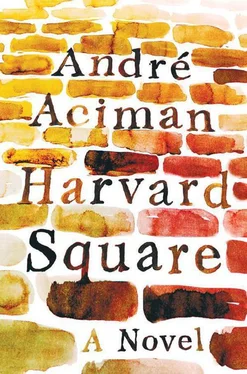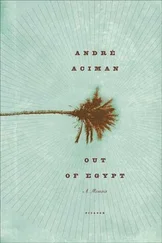Kalaj, I could tell, was shaken. Maybe it was the boy’s youth, or the son he never had, or never knew he had, or wished he had. Maybe it was just Chopin.
“Let’s hope he plays something else,” I said, trying to ease the tension on Kalaj’s face and allow him to stay without having to ask whether I minded.
“No. Enough classical music for one night.”
I knew what he was thinking: there were no women at Café Algiers that evening.
That night we ended at the Harvest, which was across the narrow passage connecting Brattle Street to Mount Auburn Street. Just some wine, we agreed. Poor man’s fare. It cost a bit more than a dollar twenty-two, but not much more. Kalaj rolled his cigarettes, which saved him a lot of money, because he was constantly smoking. From time to time, I’d glimpse a woman staring as he rolled a cigarette. He would keep rolling and rolling, seemingly unaware of everyone around him, and then suddenly, once it was rolled and he seemed happy with it, he’d whip out his finished cigarette, turn around, and hand it to the woman who’d been staring all along. It was a conversation piece. Everything was or became a conversation piece. You started with almost nothing, it didn’t matter what — Walden Pond, the weather, vichyssoise, anything — provided you started. If the other was interested, and there was no reason why she shouldn’t be, she’d raise you. Then, all you did was raise her again, always by a penny, never more. Never rush, never hesitate, never stop staring, and never fold. And be cheerful. Things, as he also liked to say, always led somewhere, most likely to a bedroom, but as long as you kept the pennies coming, they always took you by surprise, even when you knew where they were headed all along. One day in a very small café in Paris he had kept them coming. She was a rich magazine editor from Italy. They spoke about food, she loved food, she needed a cook, he knew how to cook… The rest, well, he’d already told everyone in Cambridge.
In this case, the woman to whom he offered a cigarette was the model with bathroom problems we had seen the week before at Café Algiers. Even before I’d noticed anything, he had already scanned the room, spotted her seat, and then zeroed in on the table next to hers with the instant accuracy of a sharpshooter. The conversation started. Over a nothing.
“Do you like the cigarette?”
“Very much,” she replied.
He nodded at her answer, then paused before speaking, as though appraising the deeper meaning of her answer.
“You know, though, that Dutch tobacco is better than regular Virginia.”
She nodded.
“But the tobacco I like best is Turkish.”
“Well, Turkish, yes, of course,” she immediately said. She too, it seemed, was an expert in matters tobacco. I wanted to laugh. The glint in his eye when he caught my attempt to stifle a laugh told me that he too had caught her attempt to put on a show of knowing a thing or two about tobacco.
“I started smoking Turkish tobacco in my native city.”
“Where is it?”
“Sidi Bou Saïd, the most beautiful whitewashed town on the Mediterranean, south of Pantelleria. In the summertime, the pumice stones roll to the shores and the children gather them up in large wicker baskets and sell them to the tourists for nothing.”
She looked totally spellbound by his description. “Where is Pantelleria?”
“Where is Pantelleria?” he asked, as though everyone was supposed to know. “It’s an amazing island in the Straits of Sicily. Ever been to Sicily?”
“Never. Have you?” she asked.
His thoughtful, drawn-out nod was meant to suggest that Pantelleria was not just a place but an experience to which words could do no justice.
I knew where this was going and excused myself to go to the bathroom.
On my way there, I peeked into the main dining room, and bumped into Professor Lloyd-Greville. He was the last person I wanted to be seen by in a bar, given my standing in the department. I’d been avoiding him since failing my comprehensives. He was having dinner with his wife and an academic couple from Paris in the more fashionable and far more expensive French part of the establishment. Would I mind coming and saying hello? Of course not. I knew his wife from departmental parties. She and I always ended up making small talk in what she called “our intimate little corner” in their large living room overlooking the Charles. Departmental parties are usually the bane of academic wives, but she had turned her husband’s position into a thriving source of clients for her real estate business, which she operated nonstop, even when they were away during their long summer stay in Normandy. She was originally from Germany but had lived and studied in France and enjoyed playing the role of the deracinated soul cast ashore in New England who was forever sympathizing with equally deracinated sister souls, especially if they were younger, callow graduate students. “And how is the thesis coming along?” she asked. I affected a horrified gasp as though to say: Lady, would you please, it’s still summer. She put on an amused if mildly mischievous pout to mean: So what naughty things have you been up to this summer that are keeping you away from your work? It was not flirting, just verbal ping-pong. I was dying to slam the ball but too polite to stop the back-and-forth.
I told her about my comprehensives. She was sad, thought a while, then almost winked, meaning, I’ll look into this, as she gave her husband a reprobatory gaze to suggest he had been a bad boy and should have known better than to flunk a young man like me. It meant: I’ll see what I can work at my end . But it could just as easily have meant nothing at all.
She had spotted me once having lunch by myself at the Faculty Club and never forgot it. Playing the impoverished grad student, are you? Well, you’re not fooling anyone, my dear. Trying to disabuse her would have required making too many admissions, and she’d still think me a liar, which would have made things worse. So I let her think I was not starving. To keep up appearances, I’d always manage to send her a new book that we happened to discuss in our “intimate little corner” during the monthly evening get-togethers in her living room. A new hardcover book was out of the question in my budget, but calling the publisher in New York and claiming I was eager to review a specific title was easy, and they usually fell for it when I alleged to have an assignment from some obscure journal. I called it reading on credit, since I’d always make a point of looking over the volume before wrapping it with gift paper and dropping it with Mary-Lou, our departmental secretary, who’d make sure to let Mrs. Lloyd-Greville know there was a petite surprise waiting for her. A few days later a small, thick, square envelope, lined in pearl gray paper bearing her embossed name on the outside, would arrive in my mailbox with a friendly thank-you message written in royal blue ink. You were not meant to spot — but of course were definitely meant to notice — the crested, semi-faded watermark bearing the expensive jeweler’s name.
At the dinner table at the Harvest, the professor and his friend made perfunctory pleasantries on the subject of comprehensive exams and dissertations and recalled how dreadful and humiliating these public spectacles used to be in their day when the two were students in Paris.
“Remember So-and-so, and then such-and-such?”
“Say no more,” replied his guest, “but let me tell you”—turning to me—“you guys have it easy.”
“Oh, I don’t know,” said Mrs. Lloyd-Greville, twitching her features in a coded expression that mimed a look of subtle solidarity with yet another wink-wink . “Are you still going to write on La Princesse de Clèves one day?” she asked with a peevish little grin implying, See, I haven’t forgotten . I nodded.
Читать дальше












